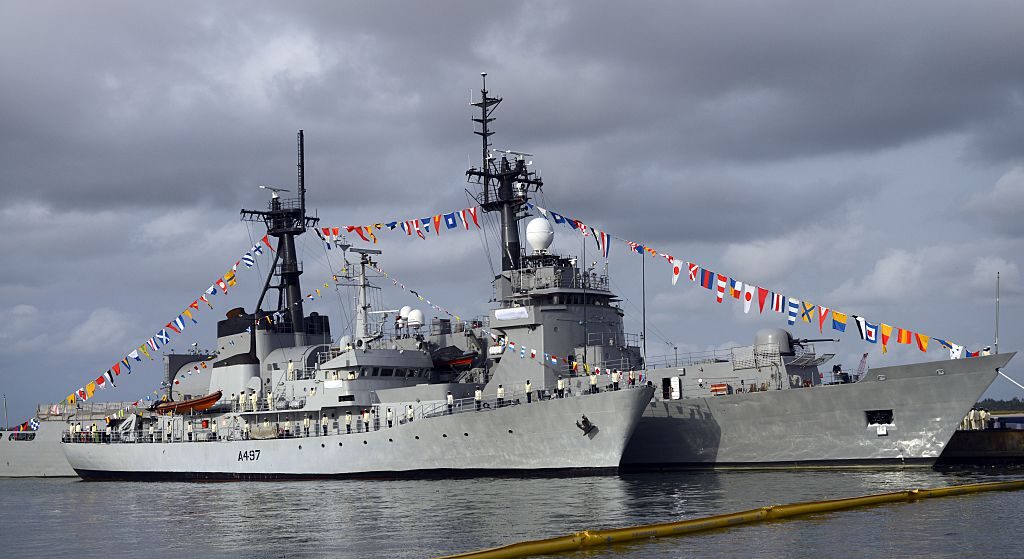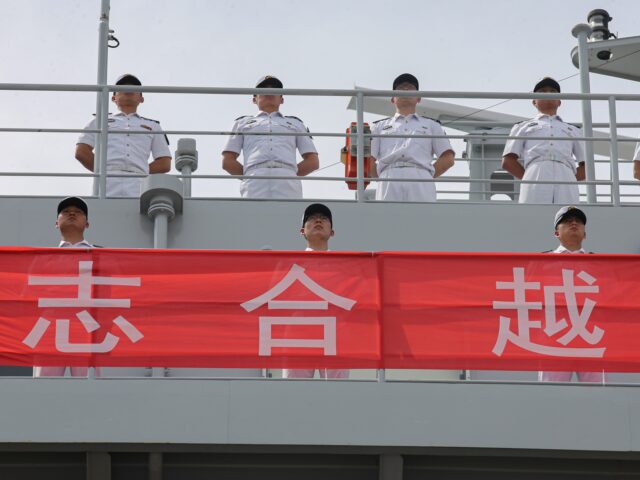A fleet of Chinese warships made port in Nigeria on Sunday for a five-day visit, a rare show of Chinese naval strength in West Africa hailed by China’s ambassador as a “major event in the relations” between the two countries, and between China and Africa at large.
According to Chinese Ambassador Cui Jianchun, the People’s Liberation Army Navy (PLAN) was “warmly welcomed” by Nigerian officials. The Nigerian Navy said it was “willing to work with China to respond to maritime security threats and maintain peace and stability in the Gulf of Guinea.”
The Chinese fleet included the destroyer Nanning, the frigate Sanya, and a supply ship called Weishanhu. The Nanning berthed at the port of Lagos to receive visitors.
Reuters explained that China has big business interests in Nigeria, including a bottomless thirst for Nigerian oil, and the PLAN would very much like to build a naval base somewhere along the Gulf of Guinea:
Oil-rich West Africa is an important global exporter of crude. The region, mostly Angola and Nigeria, is among China’s top oil suppliers. Major Chinese oil explorer CNOOC Ltd also engages in deep-sea production off the coast of Nigeria.
In January, Nigeria opened a billion-dollar Chinese-built deep seaport in Lagos. The new Lekki deep sea port, one of the region’s biggest, is 75%-owned by state-owned China Harbour Engineering Co. and the Singapore-based Tolaram group.
The Gulf of Guinea has long been a hotbed of piracy, although the security situation began improving over the past two years thanks to growing international security cooperation.
The United States is a major arms supplier for Nigeria, especially to support the Nigerian military against jihadi groups like Boko Haram. Nigeria also buys weapons from China, which accounted for about a third of Nigeria’s military imports in 2021.
The Nigerians historically have imported a good deal of military hardware from Russia as well but, as international sanctions were leveled against Russia in the wake of its Ukraine invasion, the Nigerians reportedly considered shifting some of their business from Russia to China.
China’s heavy investments in Nigeria have been criticized for making the country heavily dependent on Chinese loans. Most of the jobs created by these debt-riddled projects are given to Chinese workers, rather than Nigerians. Local activists complain Chinese companies operate above and beyond Nigerian law.

File/A picture taken on February 19, 2015 shows the two offshore patrol vessels built by Chinese Shipbuilding and Industry Corporation (CSIC) for Nigerian Navy after their commissioning ceremony, on February 19, 2015 in Lagos. (PIUS UTOMI EKPEI/AFP via Getty Images)
The Financial Times (FT) on Monday reported a major new Chinese investment in Nigeria: a plan to create a “super app” for Africa-wide financial transactions, comparable to China’s giant e-commerce platform Alipay.
Chinese-backed mobile phone payment platform PalmPay already allows its Nigerian users to “pay utility bills, top up mobile phone accounts, pay about 500,000 merchants for a variety of goods and services, make bank transfers, arrange loans, receive money and perform a host of other transactions.”
PalmPay and its competitors hope to expand from the economic and financial hub of Nigeria into other African markets. According to the World Bank, 64 percent of Nigerian adults still lack a bank account, but since smartphones are very affordable in Nigeria, the potential for growth in mobile payment systems is considerable.
FT noted that Chinese investment in massive Nigerian projects such as railroads, airports, seaports, and hydropower opens doors for other Chinese companies to score big contracts and win swift approval for projects. In fact, so many doors have been opened that some Nigerian officials are worried about Beijing taking over their financial and digital infrastructure.
“We always need to be pragmatic to balance Chinese influence. Chinese loans to the government have been growing and there is always secrecy. We need to be careful,” one Nigerian official told FT.

COMMENTS
Please let us know if you're having issues with commenting.